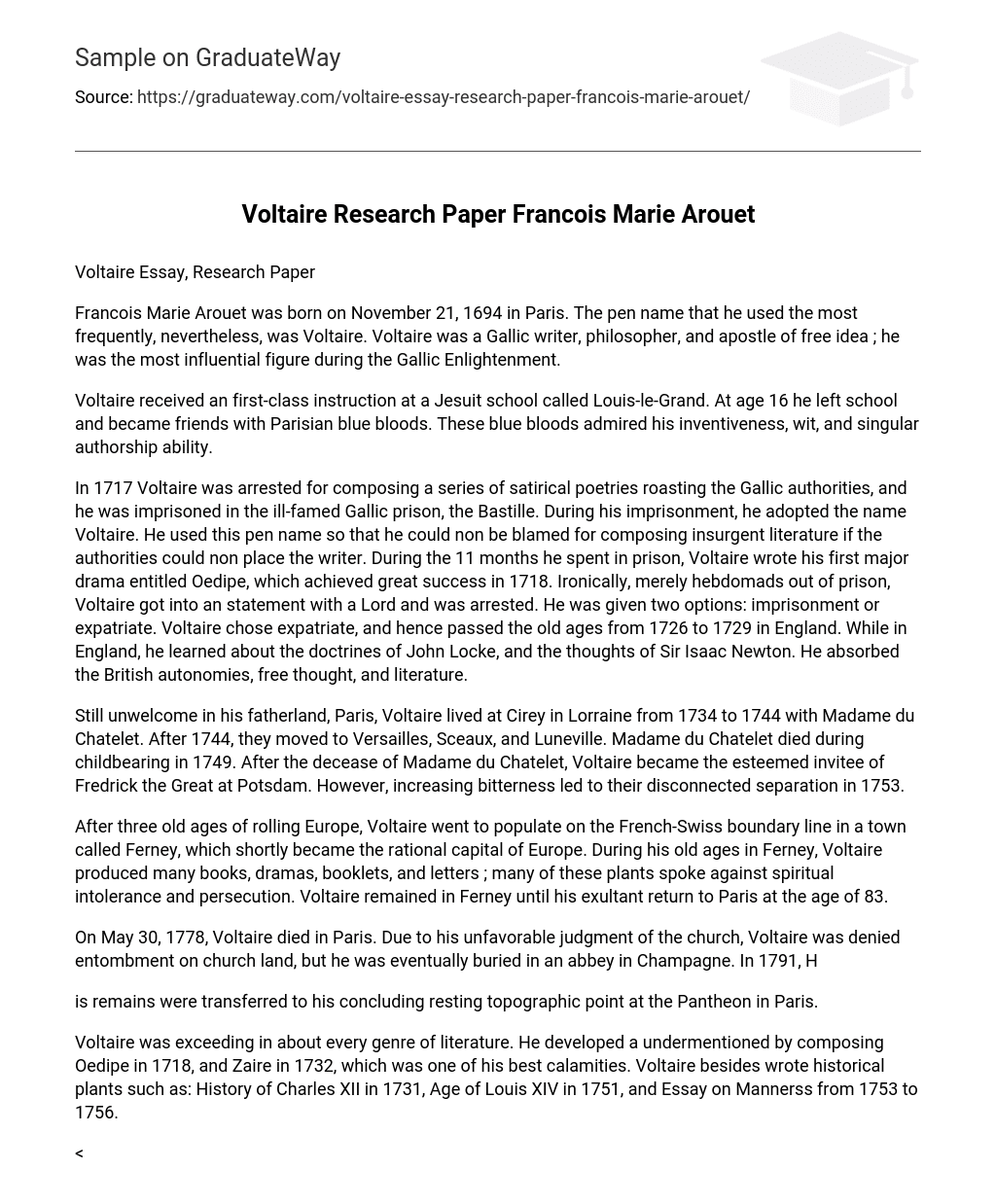Francois Marie Arouet was born on November 21, 1694 in Paris. The pen name that he used the most frequently, nevertheless, was Voltaire. Voltaire was a Gallic writer, philosopher, and apostle of free idea ; he was the most influential figure during the Gallic Enlightenment.
Voltaire received an first-class instruction at a Jesuit school called Louis-le-Grand. At age 16 he left school and became friends with Parisian blue bloods. These blue bloods admired his inventiveness, wit, and singular authorship ability.
In 1717 Voltaire was arrested for composing a series of satirical poetries roasting the Gallic authorities, and he was imprisoned in the ill-famed Gallic prison, the Bastille. During his imprisonment, he adopted the name Voltaire. He used this pen name so that he could non be blamed for composing insurgent literature if the authorities could non place the writer.
During the 11 months he spent in prison, Voltaire wrote his first major drama entitled Oedipe, which achieved great success in 1718. Ironically, merely hebdomads out of prison, Voltaire got into an statement with a Lord and was arrested. He was given two options: imprisonment or expatriate. Voltaire chose expatriate, and hence passed the old ages from 1726 to 1729 in England. While in England, he learned about the doctrines of John Locke, and the thoughts of Sir Isaac Newton. He absorbed the British autonomies, free thought, and literature.
Still unwelcome in his fatherland, Paris, Voltaire lived at Cirey in Lorraine from 1734 to 1744 with Madame du Chatelet. After 1744, they moved to Versailles, Sceaux, and Luneville. Madame du Chatelet died during childbearing in 1749. After the decease of Madame du Chatelet, Voltaire became the esteemed invitee of Fredrick the Great at Potsdam. However, increasing bitterness led to their disconnected separation in 1753.
After three old ages of rolling Europe, Voltaire went to populate on the French-Swiss boundary line in a town called Ferney, which shortly became the rational capital of Europe. During his old ages in Ferney, Voltaire produced many books, dramas, booklets, and letters ; many of these plants spoke against spiritual intolerance and persecution. Voltaire remained in Ferney until his exultant return to Paris at the age of 83.
On May 30, 1778, Voltaire died in Paris. Due to his unfavorable judgment of the church, Voltaire was denied entombment on church land, but he was eventually buried in an abbey in Champagne. In 1791, H is remains were transferred to his concluding resting topographic point at the Pantheon in Paris.
Voltaire was exceeding in about every genre of literature. He developed a undermentioned by composing Oedipe in 1718, and Zaire in 1732, which was one of his best calamities. Voltaire besides wrote historical plants such as: History of Charles XII in 1731, Age of Louis XIV in 1751, and Essay on Mannerss from 1753 to 1756. Most significantly, Voltaire was, and remains, a celebrated philosopher and combatant for reform. His ideas were expressed in verse forms, piece of lands, booklets, and narratives. His last plants, peculiarly Candide, are still universally read and admired.
Voltaire was the most fecund letter writer of his century. His 1000s of letters portray his life and personality ; they reflect his humor, his thoughts, and they describe his life style. An interesting side of Voltaire is seen through the love letters he wrote to his niece, Madame Denis, who at one clip was his kept woman.
Voltaire was the leader, main organiser, and propagandist of the reformer group called philosophes. He worked with Diderot and d Holbach, celebrated encyclopaedia authors, on an encyclopaedia. In 1770, nevertheless, Diderot and Voltaire had a difference on godlessness and separated.
Voltaire preferred enlightenment absolutism for France, although favoring constitutional monarchy for Britain and a more democratic authorities for Switzerland. One of Voltaire’s mottos was Ecrasez I infame or oppress the ill-famed. He used this against the church, Christianity, and intolerance, which he viewed as ill-famed establishments. His other marks were the awful systems of condemnable justness, unjust revenue enhancement, and censoring of the imperativeness.
Despite his agreeableness for organized faith, Voltaire ever opposed spiritual persecution. He felt the construct of God was necessary to explicate the existence and life, but he did non believe in one holding a psyche. He besides believed in the freedom of idea, the regard for persons, and said that literature should be utile and concerned with the jobs of modern twenty-four hours.
Although Voltaire was known chiefly as a reformist and a Teller of tall narratives, he had a acute consciousness of what is now called the human predicament- the battle that mankind experiences while life in society. Today, Voltaire is known as one of the universe’s greatest authors and philosophers whose manner, humor, thoughts, positions, and his acute sense of justness was merely misunderstood in his clip.





